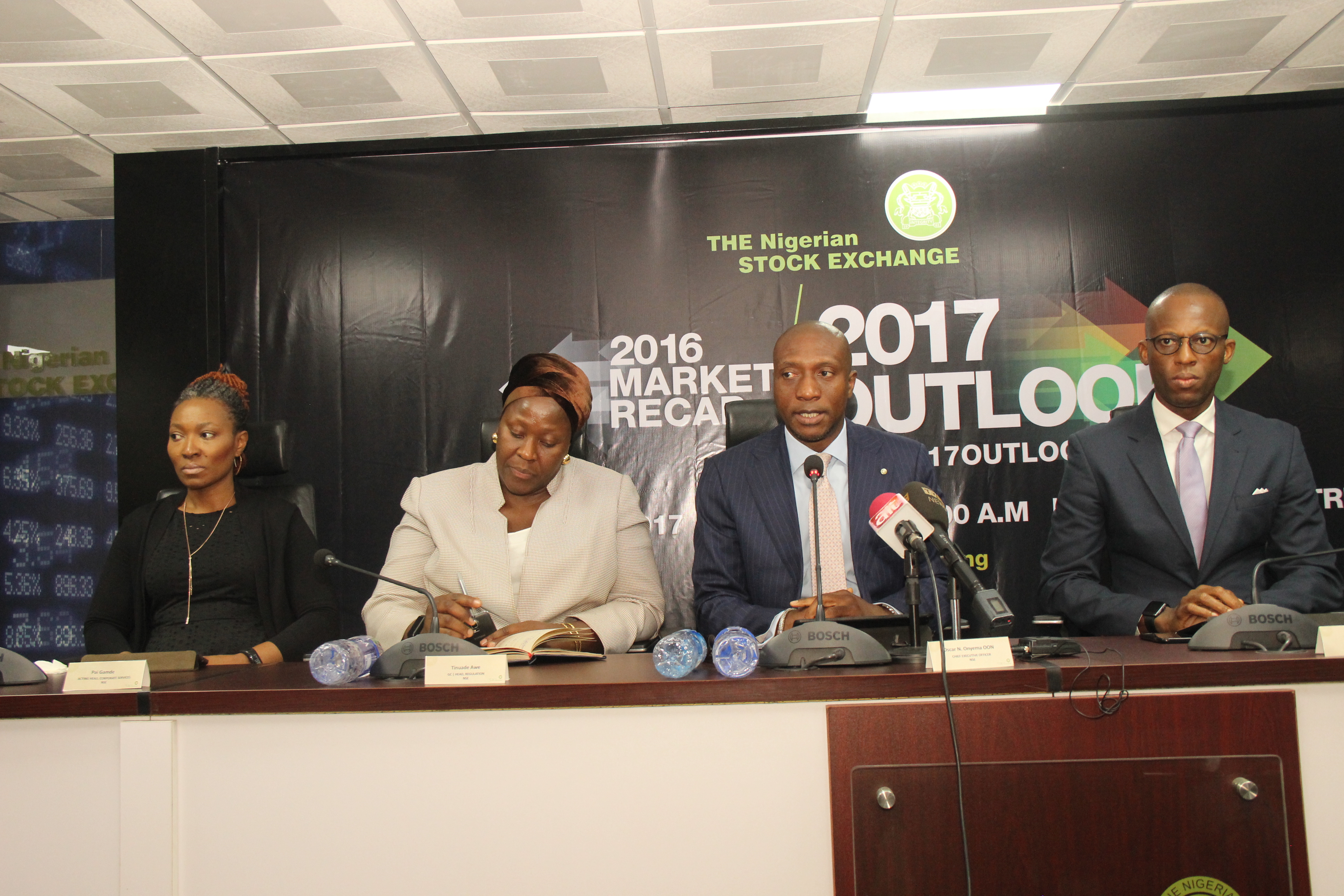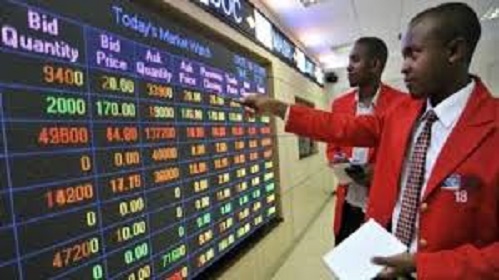
Photo caption: (From Left) Pai Gamde, Acting Head, Corporate Services Division, The Nigerian Stock Exchange (NSE); Tinuade Awe, General Counsel & Head, Regulation, NSE; Oscar N. Onyema, OON, Chief Executive Officer, NSE; and Adeolu Bajomo, Executive Director, Market Operations & Technology, NSE at the 2016 Market Recap & 2017 Outlook on Thursday, January 12, 2017
For the Nigerian economy to recover from its recession mode this year, Oscar Onyema, chief executive officer of the Nigerian Stock Exchange (NSE), on Thursday in Lagos, urged its managers and policy makers to fashion the right combination of strategies.
The World Bank and the International Monetary Fund (IMF) have predicted at various times that Nigeria’s Gross Domestic Product (GDP) would come out of recession this year, after which it could grow by 1% and 1.1% respectively.
According to the World Bank Group’s “January 2017 Global Economic Prospects” report released on Tuesday, the slim growth by Nigeria is expected to be far below Sub-Saharan Africa’s 2.9%, just as the 1.1% by South Africa, and 1.2% by fellow oil producer- Angola.
Addressing stockbrokers and journalists, Thursday, on the “2016 Market Recap and Outlook for 2017,” Onyema said despite these suggestions of modest recovery for Nigeria this year, the exchange has chosen to be “cautiously optimistic,” since recovery is dependent on ability of the policy makers to implement the “right combination of policy measures.”
In view of the ever evolving economic realities on ground, he said “the NSE will take an adaptive approach to strategy execution in 2017.
“In the immediate future, the NSE will focus on achieving its goal of becoming a more agile and demutualized exchange and will fast track efforts towards developing innovative products such as exchange traded derivatives to provide investors with tools to better weather economic realities in 2017,” he added.
These notwithstanding, Onyema said the bourse still hopes to engage the nation’s “policy makers to drive policies that will free up the system and promote the ease of doing business in Nigeria.”
For a start, he urged government to put in place incentive schemes for economic sectors capable of supporting the envisaged export-led economy; besides “the systematic removal of impediments to doing business and therefore reduction of leakages will attract private sector investments.”
The exchange, he assured, would continue engaging “government to promote the listing of privatised state-owned entities (SOEs), as well as engage with the Private sector issuers for listings across all of our product categories.
“We anticipate that secondary market activity will be challenged initially as the impact of various policy measures work their way through the system.
“However, we expect to see a revival of supplementary listings, return of the new issuance market, and potentially one IPO since the equity market is a forward indicator of the economy,” Onyema added.
Reviewing the performance of the NSE for 2016, Onyema said market capitalisation or cumulative investors’ worth fell by N603.367 billion or 6.12% from N9.859 trillion at the end of 2015 to N9.255 trillion last year; while in US$ terms, the drop was even more significant, shrinking by $19.1 billion or 38.64%, as a result of the huge Naira devaluation by the Central Bank of Nigeria (CBN) within the year and based on an exchanged rate of N305/$, from N199.35/$ in 2015.
It was not just equity prices that experienced a free-fall, as the value of listed bonds fell by 3.01% to N6.925 trillion from N7.14 trillion; and in US$, value was down by 36.61% to $22.70 billion.
During the year also, stockbrokers crossed a total of 95.814 billion shares, up by 3.19% from 92.851 billion units traded in 2015, but total turnover value dipped by N377.12 billion or 39.58% from N952.826 billion to N575.706 billion. The decline was far worse in US$, down by $2.892 billion or 60.51% to $1.886 billion.
Average daily equities volume rose also from N375.918 million to N386.914 million; just as value declined to N2.33 billion from N3.857 billion, a 39.58% fall; while in US$, it fell to $7.641 million from $19.35 million.
The number of listed companies for the year also dropped to 170 from 184; and equities from 190 to 175; while the exchange opened for 247 days of the year, just as in the previous one.














